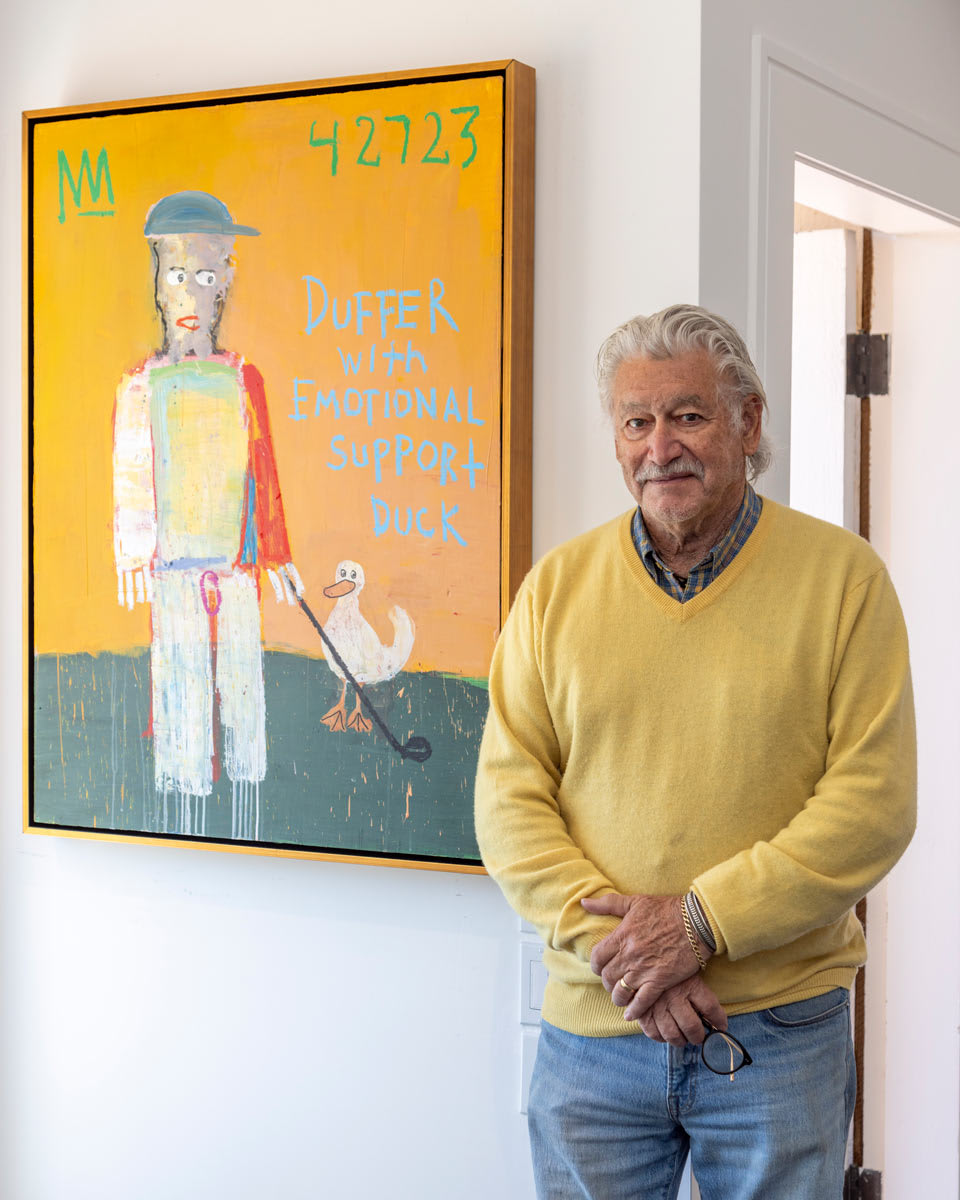The Abstract Works and Social Commentary of Artist Michael Snodgrass
by Brett Wilbur
At Monica Graham Fine Art in Carmel-by-the-Sea, passersby often do a double take when noticing certain pieces through the window. The eye-catching work of artist Michael Snodgrass is a conversation starter due to the versatility and uniqueness of his style.
“We call it Michael’s corner,” says owner Monica Graham. “For some of his pieces, people have asked, ‘Is that a Picasso?’”
A grouping of black-and-white paintings and painted sculptures were part of a series of matadors and bulls that intrigued gallery guests, as well as wildly popular variations of a shadowy horse and rider like one holding a spear and shield against a bold yellow backdrop with the words “Don Quixote” written in dripping red paint.
“We sold out of those right away,” Graham says.
Collectors at times ask if artist Jean-Michel Basquiat influenced Snodgrass, but Graham feels that while Snodgrass references 1980s-era New York City Neo-Expressionists in his style, he is a less serious social critic. His art, she says, is classified more as Abstract Primitive; Snodgrass emphasizes his appreciation of primal art, a blend of Native American, early Spanish, and New Mexican flavors.
“The colors and the lightheartedness of his pieces really resonate with people,” Graham shares.
Snodgrass, who has gone back and forth between living in Carmel and New Mexico, grew up in the Bay Area and wanted to become a professional artist as soon as he was out of high school.
“I was an artist’s assistant, painting backgrounds and then learning how to do the foregrounds,” he says. “But my parents were very uncomfortable with me being an artist, and my father insisted I go into the family business of construction…I became a cabinet maker and a furniture maker.”
Years later, Snodgrass returned to the world of art and started working with sculptures made of found objects and painting realistically but found Realism “contrived” and preferred to paint an interpretation of what he saw.
“The impression of something makes it through the filter of my sort of twisted mind,” he says.
“I have an appreciation for primal art from around the world. When I switched to that style of painting, my work started flying out of galleries.”
Snodgrass who now works out of his studio in Santa Fe, New Mexico, is incredibly prolific, eager to get to work each day. His styles and subjects vary widely, including floral still lifes, series of dogs, folk art, Spanish bullfighters, and satirical pieces of golfers, art critics, and wine collectors.
“I tend to jump around quite a bit,” he says. “I get bored easily and my thoughts meander.”
Snodgrass infuses his humor and disdain for snobbery into many of his most popular pieces.
“I started off painting art critics because they are the most ridiculous people in the world,” he says. “I also found the area of wine snobs hysterical and painted them as well. My work always has some humor in it.”
Certainly, the series of golfers, mostly men, like “Duffer with Emotional Support Duck” portraying a golfer holding his club next to his “emotional support duck” is openly satirical. Symbols, often of wealth and status, are often woven into his works.
“I’ve made my career out of mocking men,” Snodgrass says. “The stupidest things ever done are by men and usually involve alcohol. Women are so much more sensible. There are very nice people who engage in golf and are very serious about it and from my remote perspective, it’s humorous. I don’t intend for it to be mean-spirited but lighthearted.”
Clearly, the message is well received by the subjects, as Snodgrass says, “Lots of people who buy my work fit these profiles in some regard.”
Buyers often hang such pieces near their wine collections, like the acrylic painting “Wine Auction” that portrays a “1st-time wine buyer” and a “smug wine buyer” amidst phrases written in oil stick like “wines of Utah” that are “aged in cardboard for days.”
“There is no wine industry there,” Snodgrass says with a smile. “The Utah soil is unfit.”
Snodgrass, who is collected by buyers all around the world, has chosen Monica Graham Fine Art to be the only gallery in Carmel to currently represent him.
“Some kind of magic happened between us,” he says. “She has sold the heck out of my work and is a joy to work with.”
Monica Graham Fine Art is located on the NW corner of 6th Avenue and San Carlos Street in Carmel-by-the-Sea.
For more information, visit monicagrahamfineart.com.







